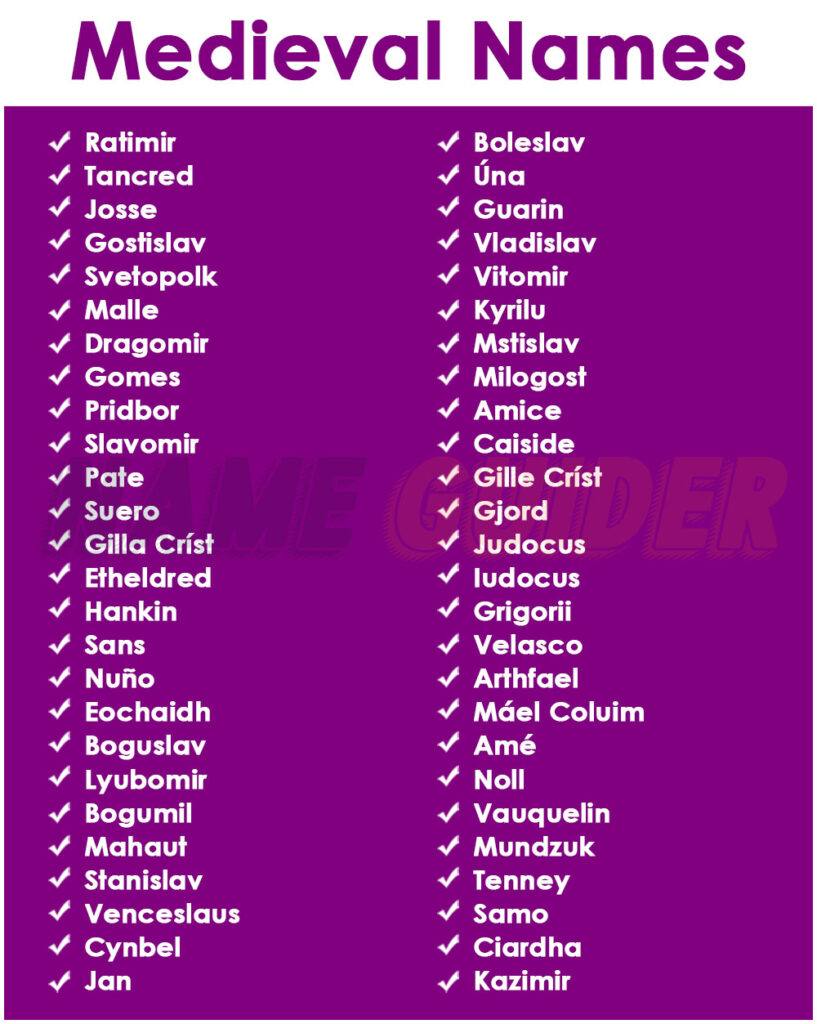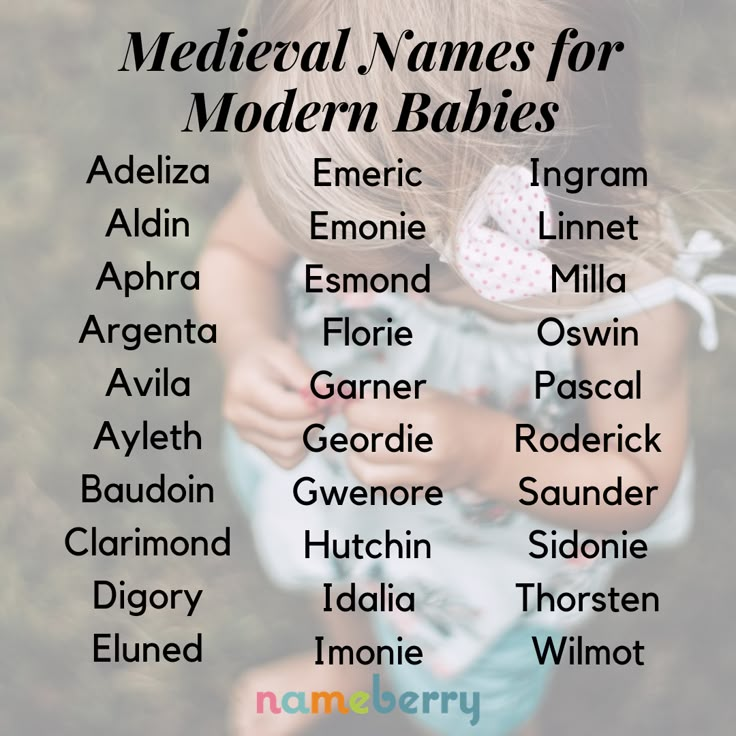Medieval namesa captivating echo of a bygone era, whispering tales of chivalry, courtly love, and epic battles.
Medieval names, originating from the Middle Ages (5th to 15th centuries), were more than just identifiers; they were reflections of social status, family lineage, and cultural heritage. From the majestic 'Arthur' to the enchanting 'Guinevere,' these names evoke images of knights in shining armor, fair maidens, and the grandeur of medieval courts.
The significance of medieval names lies not only in their historical charm but also in their enduring influence. Many names popular today, such as 'William,' 'Elizabeth,' and 'Sophia,' have their roots in the medieval era. These names carry with them a sense of tradition and timeless appeal.
Read also:The Ultimate Guide To Understanding Trump Delegates
The study of medieval names offers a fascinating glimpse into the lives, beliefs, and social structures of medieval societies. By examining the etymology and usage of these names, historians and linguists gain insights into the cultural and linguistic landscapes of the time.
Medieval Names
Introduction: Medieval names were influenced by a multitude of factors, including social hierarchy, religion, geography, and cultural traditions.
Key Aspects:
- Social Hierarchy: Names reflected social status, with nobles often bearing elaborate names derived from their titles or estates.
- Religion: The rise of Christianity brought a wave of biblical names, such as 'John,' 'Mary,' and 'Peter.' Saints' names were also popular.
- Geography: Names were often inspired by local landmarks or geographical features, such as 'Hill' or 'River.'
- Cultural Traditions: Celtic, Germanic, and Norse influences shaped many medieval names, particularly in rural areas.
Discussion: The interplay of these factors resulted in a rich tapestry of medieval names. For example, a noblewoman named 'Eleanor of Aquitaine' bore a name that reflected her high status and geographical origin.
Medieval Names and Identity
Introduction: Medieval names were integral to personal and communal identity.
Facets:
Read also:Dorothy Doss A Trailblazing Educator And Civil Rights Advocate
- Personal Identity: Names distinguished individuals within their communities.
- Family Lineage: Surnames, which became common in the late Middle Ages, indicated family connections.
- Cultural Affiliation: Names reflected the ethnic, religious, or cultural background of individuals.
Summary: Medieval names played a crucial role in shaping personal and group identities, providing a sense of belonging and continuity.
Medieval Names in Modern Times
Introduction: Medieval names continue to captivate and inspire in the present day.
Further Analysis:
- Historical Significance: Medieval names evoke a sense of history and tradition, connecting us to our cultural past.
- Literary Influence: Medieval names are often used in literature, film, and television, adding depth and authenticity to characters.
- Personal Choices: Many parents today choose medieval names for their children, seeking unique and meaningful names with a timeless appeal.
Summary: Medieval names remain a vibrant part of our cultural heritage, enriching our language, inspiring creativity, and connecting us to the past.
Information Table:
| Name | Origin | Meaning |
|---|---|---|
| Arthur | Celtic | Bear |
| Guinevere | Welsh | White fairy |
| William | German | Protector |
| Elizabeth | Hebrew | My God is abundance |
Medieval Names
Medieval names, hailing from the Middle Ages (5th to 15th centuries), offer a fascinating glimpse into the cultural, social, and linguistic landscapes of a bygone era. These names, more than mere identifiers, were imbued with deep significance, reflecting social hierarchy, religious beliefs, and ethnic heritage.
- Historical Significance: Medieval names evoke a sense of history and tradition, connecting us to our cultural past.
- Social Identity: Names distinguished individuals within their communities, reflecting their social status and family lineage.
- Cultural Heritage: Medieval names showcase the diverse cultural influences that shaped medieval societies, from Celtic and Germanic to Norse and Biblical.
- Literary Inspiration: Medieval names continue to inspire writers and storytellers, adding depth and authenticity to characters in literature, film, and television.
- Personal Choices: Many parents today choose medieval names for their children, seeking unique and meaningful names with a timeless appeal.
In conclusion, medieval names are not merely relics of the past but vibrant threads connecting us to our cultural heritage. They offer insights into the lives, beliefs, and social structures of medieval societies, while also continuing to inspire and enrich our language and creativity in the present day.
Historical Significance
Medieval names serve as a bridge to our cultural past, evoking a sense of history and tradition. By delving into the origins and meanings of these names, we gain insights into the lives, beliefs, and social structures of medieval societies.
- Roots in Antiquity: Many medieval names have roots in ancient civilizations, such as Greek, Roman, and Celtic cultures. These names carry with them the weight of history and mythology, connecting us to our shared human heritage.
- Reflection of Social Hierarchy: Medieval names often reflected the social status of individuals. Nobles and royalty bore elaborate names that denoted their lineage and authority, while commoners had simpler, more practical names.
- Religious Influences: The rise of Christianity during the Middle Ages had a profound impact on naming practices. Biblical names, such as John, Mary, and Peter, became increasingly popular, reflecting the growing influence of the Church.
- Cultural Diversity: Medieval Europe was a melting pot of cultures, with influences from Germanic, Norse, and Slavic traditions. This diversity is reflected in the wide variety of medieval names, each with its own unique story to tell.
In conclusion, medieval names are not just relics of the past but living connections to our cultural heritage. They offer a glimpse into the lives of our ancestors, the societies they built, and the values they held dear. By understanding the historical significance of medieval names, we deepen our appreciation for the richness and diversity of human history.
Social Identity
In medieval society, names played a crucial role in shaping social identity. They were not merely labels but markers of an individual's position within the complex social hierarchy and family lineage.
- Names and Social Status: The names of nobles and royalty were often elaborate and grandiose, reflecting their high social standing. They incorporated titles, such as "duke" or "count," and denoted their lineage, such as "de Montfort" or "Plantagenet." In contrast, commoners had simpler names, often derived from their occupation or physical characteristics.
- Family Lineage and Surnames: Surnames, which became common in the late Middle Ages, were particularly important for establishing family lineage and connections. They often indicated a person's place of origin, occupation, or relationship to a prominent ancestor. For example, the surname "Smith" denoted a person who worked as a blacksmith, while "Johnson" indicated the son of John.
- Religious Influences: Religious beliefs also influenced the choice of names. Biblical names, such as John, Mary, and Peter, were popular among Christians, reflecting the importance of religion in medieval society. Saints' names were also highly revered and often bestowed upon children in the hope of divine protection.
- Cultural Traditions: Cultural traditions and ethnic heritage played a role in shaping medieval names. In areas with strong Celtic influences, names such as "Aidan" and "Fiona" were common, while Germanic names like "William" and "Elizabeth" prevailed in regions influenced by Germanic tribes.
In conclusion, medieval names were intricately connected to social identity, reflecting the complex social hierarchy, family lineage, religious beliefs, and cultural traditions of the time. By examining the names of individuals, historians and genealogists can gain valuable insights into the social structures and cultural values of medieval societies.
Cultural Heritage
Medieval names stand as a testament to the rich cultural heritage of medieval Europe, reflecting the diverse influences that shaped its societies. These names provide valuable insights into the intermingling of cultures and the transmission of ideas during this period.
Celtic, Germanic, Norse, and Biblical traditions all left their mark on medieval names. Celtic names, such as "Aidan" and "Fiona," were common in regions like Ireland and Scotland. Germanic names, such as "William" and "Elizabeth," prevailed in areas influenced by Germanic tribes, such as England and Germany. Norse names, such as "Erik" and "Ingrid," were found in Scandinavia and areas with Viking settlements. Biblical names, such as "John" and "Mary," were popular throughout Christendom, reflecting the widespread influence of Christianity.
The adoption and adaptation of names from different cultures demonstrate the interconnectedness of medieval societies. Through trade, travel, and cultural exchange, names traveled across borders, carrying with them the stories and traditions of their origins. The presence of these diverse cultural influences in medieval names highlights the vibrant and dynamic nature of medieval Europe.
Understanding the cultural heritage embedded in medieval names is not only an academic pursuit but also a key to unlocking the past. By examining the origins and meanings of these names, historians and cultural anthropologists can gain insights into the social, cultural, and religious landscapes of medieval societies.
Literary Inspiration
Medieval names have captivated the imaginations of writers and storytellers for centuries, providing a rich source of inspiration for characters in literature, film, and television. These names evoke a sense of history, tradition, and cultural heritage, instantly transporting readers and viewers into the medieval world.
- Historical Authenticity: Medieval names lend an air of authenticity to historical fiction, immersing readers in the time and place of the story. Characters with names like "Eleanor of Aquitaine" or "Richard the Lionheart" instantly evoke the grandeur and intrigue of the medieval era.
- Character Depth: Medieval names can reveal aspects of a character's personality, background, and motivations. A character named "Aelfric" might suggest Anglo-Saxon heritage, while "Beatrice" hints at French nobility.
- Cultural Context: Medieval names provide insights into the cultural and social norms of the time. Names like "Friar Tuck" or "Lady Guinevere" reflect the religious and chivalric values of medieval society.
- Literary Legacy: Medieval names have become synonymous with certain literary archetypes. For example, "Hamlet" conjures images of tragedy and introspection, while "Don Quixote" embodies idealism and folly.
In conclusion, medieval names are not merely linguistic relics but powerful tools for literary inspiration. They add depth, authenticity, and cultural context to characters, enhancing the storytelling experience and transporting readers and viewers into the vibrant and captivating world of the Middle Ages.
Personal Choices
In the realm of personal choices, medieval names have witnessed a resurgence in popularity as parents seek unique and meaningful names for their children. This trend reflects a desire for names that transcend time, embodying historical charm and cultural significance.
- Quest for Distinction: Amidst the plethora of modern names, medieval names offer a refreshing alternative, allowing parents to bestow upon their children names that stand out from the crowd. These names carry a sense of individuality and uniqueness, setting children apart in a memorable way.
- Historical Connection: Medieval names provide a tangible link to the past, connecting children to their cultural heritage and ancestors. By choosing a medieval name, parents can honor their own family history or pay homage to a particular historical period or figure.
- Literary Inspiration: The enduring popularity of medieval literature, films, and television shows has sparked a renewed interest in medieval names. Characters with names like "Arya" and "Draco" have captured the imagination of readers and viewers, inspiring parents to adopt these names for their own children.
- Timeless Appeal: Medieval names possess a timeless quality that transcends fads and trends. They have endured for centuries, retaining their charm and elegance. Parents who choose medieval names for their children can be confident that these names will continue to be appreciated and admired for generations to come.
The growing popularity of medieval names reflects a broader cultural trend towards individuality, heritage appreciation, and a desire for names that carry a sense of history and timeless appeal. As parents continue to seek out unique and meaningful names for their children, medieval names are poised to remain a popular choice for years to come.
Frequently Asked Questions about Medieval Names
This section addresses common questions and misconceptions surrounding medieval names, providing concise and informative answers to enhance understanding.
Question 1: Are medieval names still relevant today?
Answer: Yes, medieval names remain relevant today due to their historical charm, cultural significance, and timeless appeal. Many parents choose medieval names for their children, seeking unique and meaningful names that connect them to the past and stand out in the present.
Question 2: What are some of the most popular medieval names?
Answer: Some popular medieval names include William, Elizabeth, John, Mary, Arthur, Guinevere, Richard, Eleanor, and Sophia. These names have endured for centuries, retaining their elegance and historical significance.
Summary: Medieval names offer a rich tapestry of history, culture, and personal expression. Whether used for historical accuracy, cultural appreciation, or simply as unique and meaningful choices, medieval names continue to captivate and inspire.
Conclusion
Our exploration of medieval names has unveiled their multifaceted significance, extending beyond mere identification. These names reflect the intricate social hierarchies, religious beliefs, and cultural traditions that shaped medieval societies.
The enduring legacy of medieval names lies in their ability to evoke a sense of history and tradition, inspire literary masterpieces, and provide unique and meaningful choices for parents today. As we delve into the origins and meanings of these names, we gain valuable insights into the lives and cultures of our ancestors, fostering a deeper appreciation for our shared human heritage.



